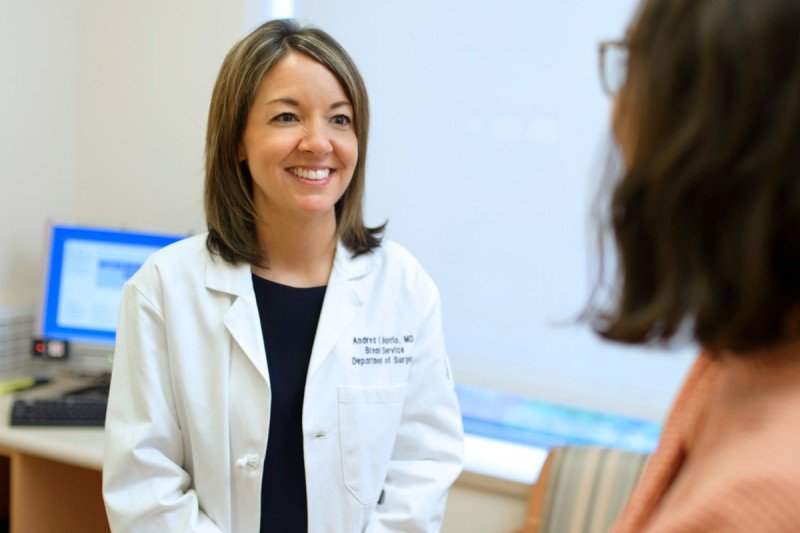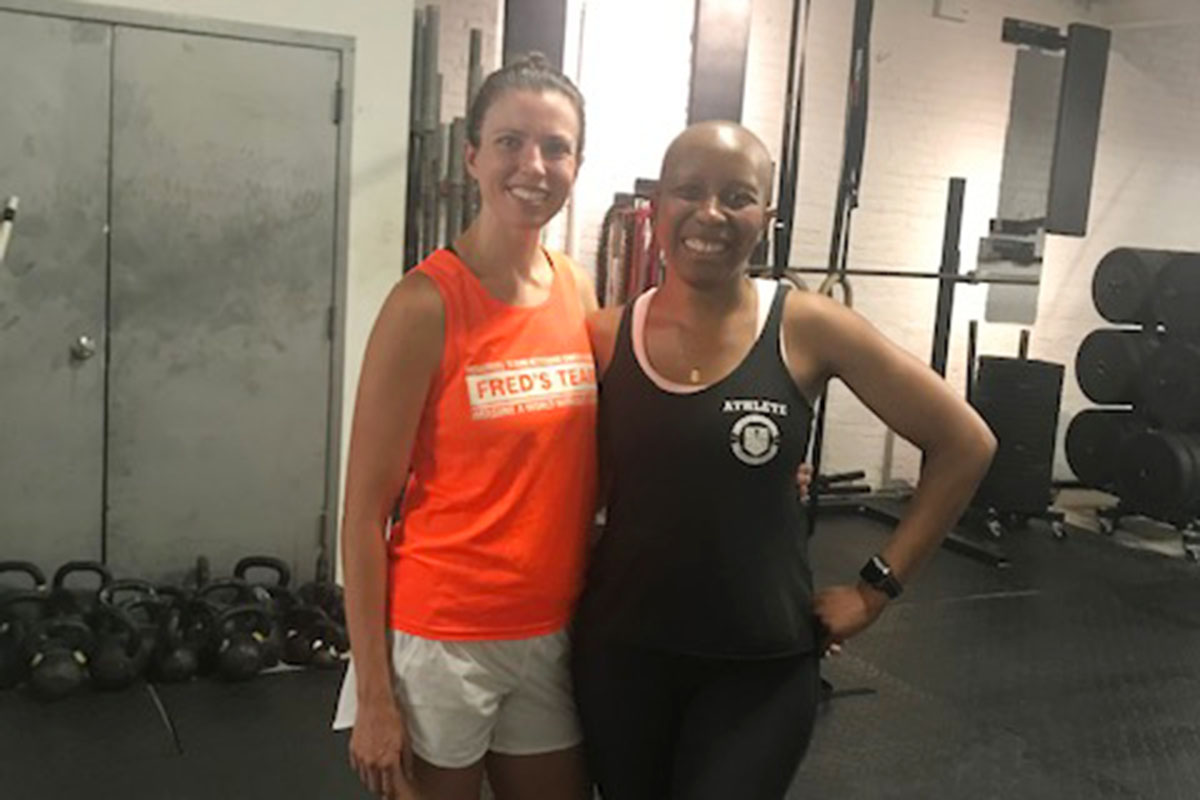
Update: Dr Andrea Barrio and colleagues from MSK published a study in JAMA Network in March 2024, which found that Black, Hispanic, and Asian women with breast cancer experience more arm symptoms and worse quality of life than white women after axillary lymph node dissection, which removes all lymph nodes in the armpit.
Theresa Langley was understandably stunned when she was diagnosed with an aggressive form of breast cancer.
Just 36 years old, she had no history of cancer in her family. She was devoted to fitness, including intense CrossFit workouts, yoga, and running marathons.
“I’ve always been a healthy person,” she explains. “When I found a suspicious lump that led to my first mammogram, cancer was the last thing on my mind.”
A flurry of tests revealed Theresa had stage 2 breast cancer.
Even more concerning, it was triple negative breast cancer, which can be harder to treat because that form of the disease doesn’t respond to drugs that target the most common growth drivers for breast tumors.
A Diagnosis and Three Goals
When Theresa came to Memorial Sloan Kettering Cancer Center, she set three goals for herself.
She wanted to recover her health. She wanted to complete a career change and become a teacher. And she wanted to help fix a problem she noticed while researching her diagnosis.
“I was saddened to see there isn’t a lot of research surrounding Black women like me or Hispanic women who suffer from breast cancer.”
She continues, “If I was able to give voice to this group of women — and all people facing breast cancer — by participating in clinical research, I wanted to do it.”
What Is Lymphedema?
That determination to help made Theresa an excellent candidate for an important new study led by MSK breast surgeon Andrea Barrio.
Dr. Barrio’s research focuses on lymphedema, a side effect from breast cancer surgery that affects about 1 in 4 female patients.
In particular, Dr. Barrio wanted to learn if race and ethnicity may play a role in who is most likely to develop lymphedema.
Dr. Barrio explains that “lymphedema is a chronic swelling of the arm that can occur after surgical removal of lymph nodes in the armpit” intended to remove malignant cells and reduce the chance of cancer recurring.
Dr. Barrio continues that “lymphedema can happen after any kind of lymph node surgery, but it most commonly occurs when you remove all the lymph nodes in the armpit — called an axillary lymph node dissection.”
‘A Hard Way to Live’
The amount of swelling in the arm can vary between patients. In severe cases, Dr. Barrio explains, “the arm swells so much that activities like brushing your teeth or buttoning your shirt can become challenging, which dramatically affects a person’s quality of life.”
Less severe cases can also have serious consequences.
“Some women,” says Dr. Barrio, “become extremely self-conscious that their appearance has changed, or they curtail activities that are good for them like exercise, fearing it could make the lymphedema worse, when it won’t. That’s a hard way to live.”
Focusing on Race and Ethnicity
Some factors that put people at higher risk for lymphedema are known, says Dr. Barrio, “including obesity.” But “we don’t know all the risk factors because studies have been fairly inconsistent.”
Specifically, it was not known if race and ethnicity might play a part.
Dr. Barrio explains, “Our study is the first time that race has ever really been looked at as a factor associated with lymphedema in what we call a prospective study,” where the participants are identified and then followed as time passes.
Dr. Barrio and her team followed 276 MSK breast cancer patients of different races for two years — because lymphedema can take many months to develop.
All the patients had undergone axillary lymph node dissection, and all were women, who form the vast majority of breast cancer patients, although men can develop breast cancer and lymphedema after surgery as well.
Black and Hispanic Women at Highest Risk
The results were striking.
After two years, 25% of all the patients developed lymphedema, a percentage that is consistent with previous research.
However, the breakdown by race showed a wide range of risk.
Thirty-nine percent of Black women in the study developed lymphedema — including Theresa. Twenty-eight percent of Hispanic women developed the condition, as did 23% of Asian women. White women had the lowest rate of lymphedema at 21%.
The study adjusted for known risk factors like the number of lymph nodes removed and body mass index.
But even after that, says Dr. Barrio, “Black race alone was the strongest predictor of lymphedema development. In fact, Black women in the study were three and a half times more likely to develop lymphedema than white women. That’s significant.”
Dr. Barrio cautions that the results for Hispanic women were based on 16 patients, “so further research will be helpful to confirm these findings.”
For patients and healthcare providers, she believes that “as we advance in our understanding of lymphedema, we can identify who is at highest risk of lymphedema and find treatments to minimize that risk in the future.”
Next Steps
The obvious question is: What puts Black and Hispanic women at higher risk of lymphedema?
Dr. Barrio says, “I am partnering with one of our plastic surgeons, Babak Mehrara, who studies lymphedema in the laboratory.”
One hypothesis they are exploring is the role of inflammation in lymphedema, which may be particularly important in Black women.
Dr. Barrio explains: “We know that inflammation is one response of the body’s immune system to surgery. We also see that Black women have higher rates of inflammation and impaired wound healing in some clinical settings like keloid scar formation,” where the scar is thickened and raised.
The connection, she says, “is that more inflammation may be contributing to higher lymphedema rates observed in Black women.”

Kindness and Urgency
As for Theresa, she says her care at MSK was excellent.
“Everyone was so kind. From the security guards to the nurses, they were always doing little things to show they cared. And they treated me with urgency, which I really appreciated.”
Theresa was especially grateful that, before COVID, her family and friends could gather in her private suite as she received chemotherapy infusions, “and the nurses and physician assistants would take photos with me and my little goddaughter.”
Front of the Class
Today, Theresa has accomplished the three goals she set for herself when she was diagnosed.
She has completed treatment, including a double mastectomy, chemo, and radiation therapy, and is again going hard in the gym.
Her advice for others who face cancer, especially younger people like herself, is to “find a different version of yourself during chemo or lymphedema that is just as awesome as your vision before the diagnosis, and use that to propel yourself through the experience.”
She also fulfilled her dream to become a teacher and now teaches sixth-grade English Language Arts in a Brooklyn public charter school.
She calls completing her graduate degree and getting her teaching certificate while undergoing treatment “my proudest moment of this whole experience.”
As for the study, she admits she’s surprised that the results showed Black and Hispanic women were at higher risk for lymphedema, saying, “I thought it might show the risk was the same for everyone.”
However, she’s gratified that her participation helped contribute new insights into the condition.
“Science is only as good as we allow it to be. Whether you are a member of an underrepresented group or not, I would encourage people to take part in studies like this. They help push science forward, and they can help people who may be going on the same journey that you’re going through.”




